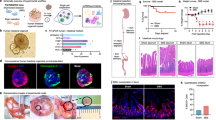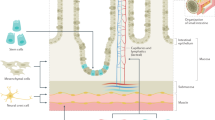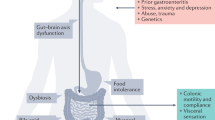Abstract
Congenital short bowel syndrome (CSBS) is an intestinal pediatric disorder, where patients are born with a dramatic shortened small intestine. Pathogenic variants in CLMP were recently identified to cause an autosomal recessive form of the disease. However, due to the rare nature of CSBS, only a small number of patients have been reported to date with variants in this gene. In this report, we describe novel inherited variants in CLMP in three CSBS patients derived from two unrelated families, confirming CLMP as the major gene involved in the development of the recessive form of CSBS.
Similar content being viewed by others
Log in or create a free account to read this content
Gain free access to this article, as well as selected content from this journal and more on nature.com
or
References
Moore KL, Persaud TVN : The Developing Human: Clinically Oriented Embryology. Philadelphia: Saunders, 2003.
van der Werf CS, Halim D, Verheij JB, Alves MM, Hofstra RM : Congenital short bowel syndrome: from clinical and genetic diagnosis to the molecular mechanisms involved in intestinal elongation. Biochim Biophys Acta 2015; 1852: 2352–2361.
Hamilton JR, Reilly BJ, Morecki R : Short small intestine associated with malrotation: a newly described congenital cause of intestinal malabsorption. Gastroenterology 1969; 56: 124–136.
Howard L, Ament M, Fleming CR, Shike M, Steiger E : Current use and clinical outcome of home parenteral and enteral nutrition therapies in the United States. Gastroenterology 1995; 109: 355–365.
van der Werf CS, Wabbersen TD, Hsiao NH et al: CLMP is required for intestinal development, and loss-of-function mutations cause congenital short-bowel syndrome. Gastroenterology 2012; 142: 453–462.
van der Werf CS, Sribudiani Y, Verheij JB et al: Congenital short bowel syndrome as the presenting symptom in male patients with FLNA mutations. Genet Med 2013; 15: 310–313.
Raschperger E, Engstrom U, Pettersson RF, Fuxe J : CLMP, a novel member of the CTX family and a new component of epithelial tight junctions. J Biol Chem 2004; 279: 796–804.
Robertson SP, Filamin A : Phenotypic diversity. Curr Opin Genet Dev 2005; 15: 301–307.
de Backer AI, Parizel PM, de Schepper A, Vaneerdeweg W : A patient with congenital short small bowel associated with malrotation. J Belge Radiol 1997; 80: 71–72.
Acknowledgements
We would like to thank all the families involved in this study. We would also like to thank Katherine MacKenzie for technical assistance with the confocal microscope. In addition, we would like to dedicate this short report in memory of the pediatric gastroenterologist involved in the diagnosis and care of one of the patients described, Dr André Deprettere. This study was supported by a grant from the Stichting Sophia Kinderziekenhuis Fonds (MMA and RMWH), a Mrace grant from the Erasmus University Medical Center (RMWH), and by the Newlife Foundation, as well as the MRC, UK (AHC).
Author information
Authors and Affiliations
Corresponding author
Ethics declarations
Competing interests
The authors declare no conflict of interest.
Additional information
Supplementary Information accompanies this paper on European Journal of Human Genetics website
Supplementary information
Rights and permissions
About this article
Cite this article
Alves, M., Halim, D., Maroofian, R. et al. Genetic screening of Congenital Short Bowel Syndrome patients confirms CLMP as the major gene involved in the recessive form of this disorder. Eur J Hum Genet 24, 1627–1629 (2016). https://doi.org/10.1038/ejhg.2016.58
Received:
Revised:
Accepted:
Published:
Issue date:
DOI: https://doi.org/10.1038/ejhg.2016.58



